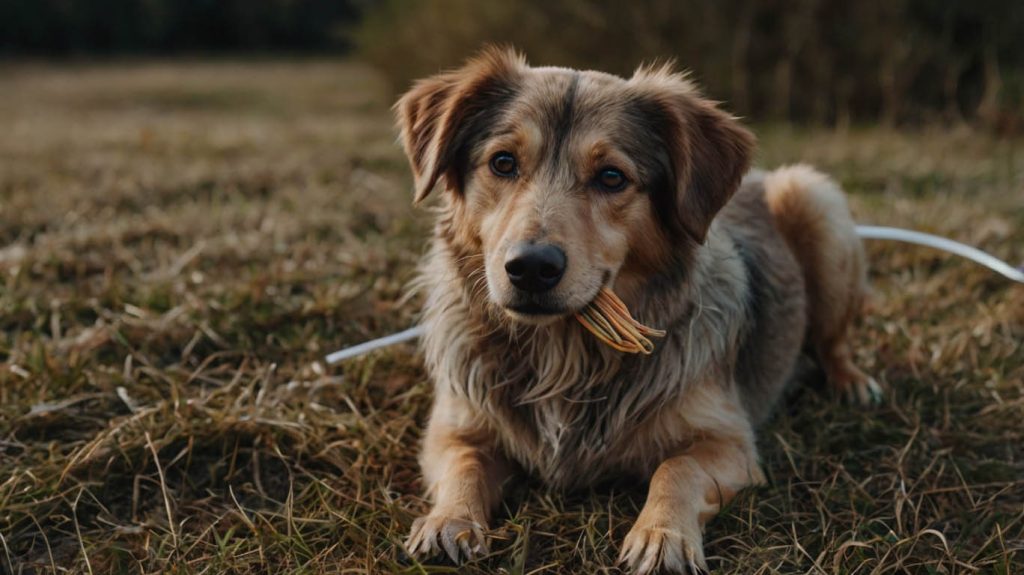The Complete Guide to the Causes of Roundworms in Dogs
The story of a roundworm infection is one of the most common tales in the veterinary world, especially for puppies. You might see the telltale signs—a pot belly or worms in the stool—and immediately wonder, “How did this happen?” Understanding the causes of roundworms in dogs is the first and most crucial step in breaking the cycle of infection and protecting your pet. These resilient and pervasive parasites have a complex life cycle with multiple routes of transmission, which is why they are so incredibly common.
This comprehensive guide will tell the complete story of how these parasites find their way into our dogs. We will begin by tracing the most common path of infection, from mother to puppy, which is why nearly all puppies are born with them. Subsequently, we will explore the other primary environmental causes of roundworms in dogs that can affect canines of any age. Furthermore, we will discuss how this knowledge directly informs the most effective strategies for prevention. Consequently, you will move from simply treating an infection to proactively preventing one, armed with a clear understanding of the enemy.
Why You Must Understand the Causes of Roundworms in Dogs
Before we detail the specific transmission routes, it’s vital to appreciate why this knowledge is so important. Roundworms (Toxocara canis) are not just a minor nuisance; they are nutrient thieves. They live in a dog’s intestines and feast on their food, which can lead to malnutrition, poor growth in puppies, and a weakened immune system. By understanding the causes of roundworms in dogs, you can take targeted, effective steps to interrupt their life cycle and keep your dog healthy. This proactive approach is far more effective than simply reacting to an infection after it has already taken hold.

The Primary Causes of Roundworms in Dogs: Tracing the Infection
Roundworms have a fascinating and resilient life cycle that allows them to spread through several different pathways. Here are the most common ways your dog can become infected.
The Most Common Cause: Transmission from Mother to Puppy
This is, by far, the number one way puppies get roundworms. In fact, it is so common that veterinarians assume virtually all puppies are born with them.
- Transplacental Transmission (Before Birth): An adult female dog can have dormant, encysted roundworm larvae in her body tissues. The hormonal changes during pregnancy can “reactivate” these larvae. They then migrate through the bloodstream, cross the placental barrier, and infect the puppies while they are still in the womb. This is one of the most direct causes of roundworms in dogs.
- Transmammary Transmission (Through Milk): After birth, the reactivated larvae can also migrate to the mother’s mammary glands and be passed to the nursing puppies through her milk. This is why a puppy can be born infected and then continue to acquire more worms as they nurse.
Ingesting Infective Eggs from the Environment
This is the most common way for adult dogs (and puppies who are no longer nursing) to become infected.
- The Story of a Contaminated Environment: An infected dog passes microscopic roundworm eggs in its feces. These eggs are not immediately infective. They must “mature” in the environment (soil, grass) for several weeks to become infective. Once mature, these eggs are incredibly hardy and can survive in the soil for years.
- How Dogs Get Infected: Your dog can then become infected by sniffing, licking, or eating anything that has been contaminated with these infective eggs. This could be soil, grass, or even a toy left in the yard. This environmental contamination is one of the most persistent causes of roundworms in dogs.
Ingesting an Infected Host (Paratenic Host)
Roundworm larvae can also infect other small animals.
- The Role of the Intermediate Host: A small animal, such as a rodent, rabbit, bird, or even an earthworm, can ingest the infective roundworm eggs from the soil. The larvae will hatch and encyst in this animal’s tissues, but they will not mature into adult worms. This animal is known as a paratenic or transport host.
- How Your Dog Gets Infected: If your dog then hunts and eats this infected small animal, the dormant larvae will “wake up” and mature into adult roundworms in your dog’s intestines. For dogs with a strong prey drive, this is a significant potential cause.

The Life Cycle: The “Why” Behind the Causes of Roundworms in Dogs
Understanding the roundworm life cycle is key. Once a dog ingests infective larvae or eggs, the larvae hatch in the intestines. From there, they embark on a journey through the body, migrating through the bloodstream to the liver and lungs. In the lungs, they are coughed up, swallowed, and return to the intestines to finally mature into adult, egg-laying worms, starting the cycle all over again. This complex migration is why a cough can sometimes be a surprising symptom of roundworms.
How This Knowledge Leads to Effective Prevention
Now that you understand the causes of roundworms in dogs, the prevention strategies make perfect sense.
- Strict Deworming Protocol for Puppies and Mothers: Because transmission from mother to pup is so common, veterinarians recommend a strict deworming schedule for all puppies, starting at 2 weeks of age, and for the nursing mother as well.
- Consistent, Year-Round Parasite Preventative: The easiest and most effective way to protect your adult dog is with a monthly broad-spectrum preventative. Most heartworm medications also control roundworms and other common intestinal parasites.
- Good Sanitation and Hygiene: This is your best weapon against environmental contamination. Promptly and properly dispose of your dog’s feces. This prevents the eggs in the stool from maturing and contaminating your yard.
- Prevent Scavenging: Supervise your dog to prevent them from eating soil, feces, or hunting small animals.
It’s also important to note that humans, especially children, can be infected by roundworm larvae, a condition called toxocariasis. The Centers for Disease Control and Prevention (CDC) provides excellent information on this zoonotic risk and emphasizes the importance of good hygiene.
You Can Break the Cycle
The story of roundworms is a story of resilience and opportunity. These parasites are masters of survival, using multiple pathways to find a host. However, their story does not have to be your dog’s story. By understanding the primary causes of roundworms in dogs—from the inevitable mother-to-pup transmission to the persistent threat in the environment—you are empowered to take decisive, preventative action. A strong partnership with your veterinarian and a commitment to a consistent prevention plan are the keys to breaking the cycle and ensuring your dog lives a healthy, parasite-free life.
Do you have questions about deworming your puppy or adult dog? Ask us in the comments below! For a complete guide to puppy health, don’t miss our article on [The Ultimate Puppy Health and Vaccination Schedule].


